Bahamian Fish Stew is a delicious and hearty dish that is popular in the Bahamas and throughout the Caribbean. It is made with fresh fish, vegetables, and spices that are cooked together in a rich and flavorful broth. This stew is the perfect comfort food for any occasion and is sure to please even the pickiest of eaters.
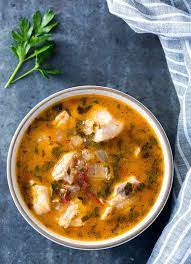
Bahamian Fish Stew is a classic Caribbean dish that is known for its rich and complex flavors. The combination of fresh fish, vegetables, and spices creates a hearty and satisfying meal that is perfect for cold nights or any occasion where comfort food is needed.
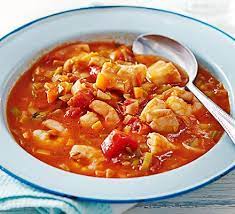
The fish used in this stew is typically grouper, snapper, or mahi-mahi, but you can use any firm white fish that is available. It is important to use fresh fish for this recipe to ensure the best flavor and texture. The fish is seasoned with salt and black pepper before being added to the stew.

The vegetables used in Bahamian Fish Stew include onion, garlic, green and red bell peppers, celery, and tomatoes. These vegetables are diced and sautéed together to create a flavorful base for the stew. Tomato paste, thyme, and a bay leaf are added to the mixture to enhance the flavor even more.
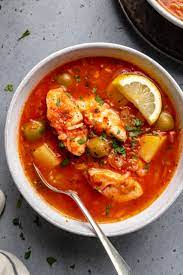
The stew is simmered in fish stock or water, allowing the flavors to meld together. You can add additional vegetables, such as carrots, potatoes, or okra, to the stew if you prefer. The fish is gently stirred into the stew and simmered until it is cooked through and tender.
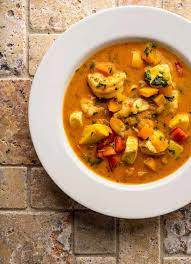
Bahamian Fish Stew is typically served hot and garnished with fresh parsley or cilantro. You can serve it with some crusty bread or rice to soak up the flavorful broth.
Nutritionally, Bahamian Fish Stew is a healthy and balanced meal that is high in protein and fiber. It is low in calories and fat, making it a great option for those watching their weight or looking for a healthy meal option.
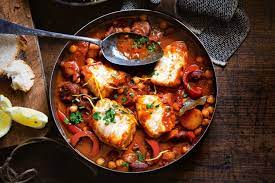
Overall, Bahamian Fish Stew is a delicious and comforting dish that is perfect for any occasion. It is easy to make, packed with flavor and nutrition, and sure to become a family favorite.
To make Bahamian Fish Stew, you will need the following
ingredients:
1- 2 lbs. of fresh fish fillets (such as grouper, snapper, or mahi-mahi)
2- 1 large onion, diced
3- 2-3 cloves of garlic, minced
4- 1 green bell pepper, diced
5- 1 red bell pepper, diced
6- 2 celery stalks, diced
7- 1-2 tomatoes, diced
8- 1-2 tbsp. of tomato paste
9- 1 tsp. of thyme
10- 1 bay leaf
11- 2-3 cups of water or fish stock
12- Salt and black pepper to taste
13- Hot pepper sauce (optional)
14- Fresh parsley or cilantro, chopped (for garnish)
Now, let's go through the step-by-step method for making Bahamian Fish Stew:
1- Start by washing and cleaning the fish fillets, then cut them into bite-sized pieces. Season them with salt and black pepper and set aside.
2- In a large pot or Dutch oven, heat some oil over medium heat. Add the diced onions, garlic, and bell peppers and sauté until the onions are translucent.
3- Add the diced celery and tomatoes to the pot and continue to sauté for a few more minutes.
4- Add the tomato paste, thyme, and bay leaf to the pot and stir to combine.
5- Pour in the water or fish stock, bring the mixture to a boil, then reduce the heat to low and let it simmer for 10-15 minutes to allow the flavors to meld.
6- Add the seasoned fish to the pot and gently stir it in. Be careful not to break up the fish pieces.
7- Cover the pot and let the fish stew simmer for another 10-15 minutes, or until the fish is cooked through and tender.
8- Taste the stew and adjust the seasoning as needed. If you like your stew spicy, you can add a few drops of hot pepper sauce.
9- Garnish the stew with chopped parsley or cilantro and serve hot with some crusty bread or rice.
Note:
You can also add other vegetables to the stew, such as carrots, potatoes, or okra, depending on your preference. You can also use canned or frozen fish if fresh fish is not available.
Nutrition Facts (per serving, based on 6 servings):
- Calories: 230
- Total Fat: 3g
- Saturated Fat: 1g
- Cholesterol: 70mg
- Sodium: 470mg
- Total Carbohydrates: 13g
- Dietary Fiber: 3g
- Sugars: 6g
- Protein: 38g
Bahamian Fish Stew is not only delicious, but it is also packed with protein and fiber, making it a healthy and satisfying meal. Enjoy!


Comments